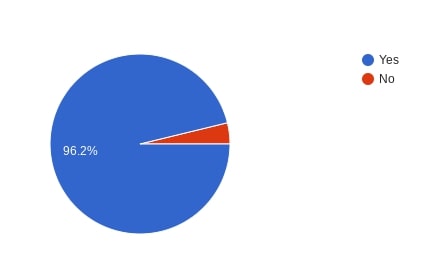Staff essay: More FLEX days need to be added back to the school calendar

Graph of a survey that was sent out to students regarding adding more FLEX days to the Lincoln calendar. According to the results, 96% of students believe more FLEX days are needed.
January 2, 2022
As the school year progresses, students start to become buried by an overwhelming number of homework assignments and tests. For some students, concerns about grades and tests can lead to a decline in mental health and overall physical wellness.
I believe more FLEX days could help alleviate that stress.
FLEX is a non-class time that allows students to check in with teachers and work independently. In previous years, students were afforded two FLEX days nearly every week. This school year, we often only have two FLEX days a month.
It isn’t enough. The Cardinal Times sent out a survey to Lincoln students about FLEX in early December. Of the 79 students who completed the survey, 96% voted that they believe more FLEX is needed. I argue we should have even more FLEX days now than we have had in previous years, as we are coming back to school after a year online which left many students with little to no support from their teachers. Students are only just starting to readjust to a full workload and in-school schedule.
Most teachers are only allowing students to retake tests during FLEX. If a student misses a test at the beginning of the month, oftentimes they have to wait two weeks to take or retake the test. Sometimes, by the time students are able to retake the tests, progress reports have already been released. Not being able to have an opportunity each week to take tests can drastically affect students’ grades as well as their mental health.
Not only are students only able to retake tests during FLEX, but it’s the only real time to check in with teachers. Having FLEX twice a month is not enough for students who might be struggling to understand class material. By the time the next FLEX days arrive, new material is being introduced, so students may never have the opportunity to fully grasp previous topics. Getting help and taking make-up tests is only part of the value of FLEX. FLEX also allows students to build better relationships with their teachers because it allows time for one-on-one interaction.
FLEX also gives students a dedicated time during the school day to catch up on homework. Every day, there is a constant flow of new assignments that students are expected to complete. Many students participate in extracurricular activities such as theater, clubs and sports in addition to their rigorous course loads.
The Lincoln administration team, and the Portland Public Schools district as a whole, should be doing all that they can to contribute to the academic success and mental health of students. Adding more FLEX days will help students succeed and feel healthier, mentally and physically.



